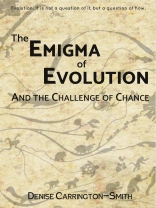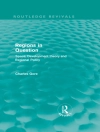Evolution. It is not a question of if, but a question of how. Commonly accepted, Darwin’s Theory of Evolution by Natural Selection leaves unanswered some fundamental questions.
How did life originate?
How did the DNA code originate?
How did multi-cellular life originate?
How did sex originate?
We all know about evolution, the brain-child of Charles Darwin which he announced in his celebrated book, On the Origin of Species. Although possibly the most famous book ever published, few have actually read it. Nevertheless, pretty much every educated person on the planet knows the name, Darwin, and most have at least a general notion of his theory of evolution. Evolution however is a broad and contentious topic that touches on very many aspects of human concern – from the origins of humanity down to the workings of the genetic code. This book sweeps across from the ancient Greeks to the latest ideas in genomics, and embraces it all.
In the middle of this rich context sits Darwin and the machinations known as ‘the delicate arrangement’ – a curious and endlessly mysterious few weeks of events in the mid 19th century. The popular Darwin narrative is firmly established, but a few of the legs it stands on, indeed relies on, are not totally solid.
Within the breath-taking survey of the many enigmas thrown up by the idea of evolution, this book also probes deeply into the puzzles within the delicate arrangement itself. Dr Carrington-Smith not only exposes the oddities but composes and presents her own, quite dramatic, tale of deceit and double dealing that explains them.
Table des matières
Part I : Before 1850 – Thoughts on Evolution before Darwin
Chapter 1 : Turning the Universe Upside Down
Chapter 2 : The Birth of Evolutionary Theory
Chapter 3 : Darwin’s ‘Great’ Grandfather
Chapter 4 : Lost in Translation
Chapter 5 : Lamarck’s Aim
Chapter 6 : Hitting the Mark
Chapter 7 : French Resistance
Chapter 8 : On Paley’s Watch
Chapter 9 : Moving Blythly Forward
Chapter 10 : Vestiges of Unity
Part II : Before 1900 – Darwin’s theory and its reception
Chapter 11 : Laying the Foundations
Chapter 12 : On Origin of Species
Chapter 13 : Journey’s End
Chapter 14 : Two Minds But a Single Thought
Chapter 15 : From Inception to Deception
Chapter 16 : Abstract Thinking
Chapter 17 : With a little Bit of Help from his Friends
Chapter 18 : Darwin’s protegé
Chapter 19 : Reactions to Darwin’s Theory
Part III : Before 1950 – Application of Darwin’s Theory and its Ramifications
Chapter 20 : Germ Plasm and Immortality
Chapter 21 : The Birth of Genetics
Chapter 22 : The Spread of Change
Chapter 23 : Change of Mind, Change of Heart
Chapter 24 : The Rise and Rise of Humanism
Chapter 25 : Darwinism in Practice
Chapter 26 : Plenty of Scope
Chapter 27 : Humans – Ancient and Modern
Chapter 28 : The Mathematics of Evolution
Part IV : Towards 2000 – All roads lead to Darwin
Chapter 29 : Evolutionary Synthesis
Chapter 30 : A ‘Noo’ Theory of Evolution
Chapter 31 : The Mystery of the East
Chapter 32 : Rediscovering Our Origins
Chapter 33 : Multiregional Evolution
Chapter 34 : Six Degrees of Separation
Chapter 35 : Punctuated Equilibrium
Chapter 36 : Chromosomes
Chapter 37 : The Rise and Fall of the Hapless Neanderthals
Chapter 38 : Lost for Words
Part V : Beyond 2000 – Truth – the Daughter of Time?
Chapter 39 : Palæolithic People of Portly Proportions
Chapter 40 : Dishing Up the Fat of the Land
Chapter 41 : Where there’s fire, there’s smoke
Chapter 42 : The Light End of the Spectrum
Chapter 43 : How Human(e) were H. Erectus?
Chapter 44 : Irreducible Complexity
Chapter 45 : Reversing ‘Scopes’
Chapter 46 : Dominant Genes
Chapter 47 : Is God a Delusion?
Chapter 48 : A Never-Ending Story
Chapter 49 : Onwards and Upwards
A propos de l’auteur
Denise Carrington-Smith received her Ph.D. from James Cook University in the History of Ideas relating to theories of human evolution. Prior to that she was Principal of the Victorian College of Classical Homœopathy and also served as President of the Australian Federation of Homœopaths. Aside from her work with Natural Therapies, specializing in homoeopathy, herbalism, and Bach Flower Remedies, Denise is also qualified as a psychologist and also a hypnotherapist. She is now retired and focus’ on writing.












